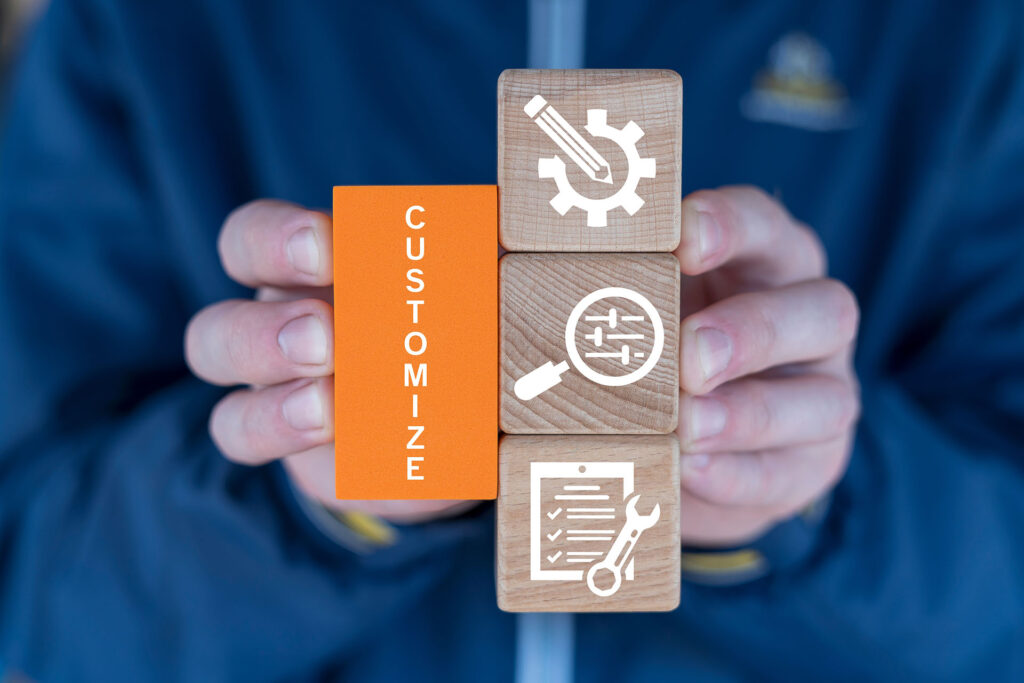How customization helps businesses make more money

In a market oversaturated with offers, companies strive to provide customers with an individual approach. One of the most effective tools for this is customization of products and services, which is their adaptation to specific customer preferences. Many successful brands use customization to increase customer loyalty and stimulate sales. Let’s look at what customization is, what benefits it brings to a business, how to implement it in the company’s processes, and what challenges you may encounter.
What is customization
Customization is the process of adjusting a product or service to the individual preferences of a particular customer. This approach allows the company to offer unique solutions that favorably differ from typical variants on the market. It is important not to confuse customization with personalization: in customization, the customer himself participates in creating a product “for himself”, while personalization implies that the company changes the product based on already known data about the customer.
Customization comes in many forms:
- Product customization. The customer can choose product characteristics – for example, color, material, equipment or size – in effect creating a product to suit his or her taste.
Example: Nike brand through the Nike by You service gives the opportunity to design sneakers by choosing colors and materials and adding personal inscriptions. - Service customization. In the sphere of services, individual approach is expressed in the adaptation of the service to the needs of the client. For example, a delivery service offers to choose a convenient delivery interval, a bank – to form a personal package of services, a marketing platform – to customize advertising to the interests of the target audience.
- Customized customer experience. Personalized interaction with the consumer at all stages increases the value of the service. Providing a personal manager, making recommendations or a special format of support and advice are all elements of a customized experience that strengthen the bond between the brand and the customer.

Benefits of customization for business
Customization gives a company a number of tangible benefits:
- Increased customer loyalty. A customer who receives a product tailored to their personal needs feels important to the brand. This forms an emotional connection and increases long-term loyalty. According to research, the introduction of customization can increase repeat sales by 20-30%.
- Competitive advantage. A unique offer created for a specific customer noticeably distinguishes a business from its competitors. Customization increases the value of the brand in the eyes of the audience and complicates the task of competitors. In some niches, a company with a customized product may remain out of direct competition for a while.
- Revenue growth. Customized products and services often generate more revenue for a business. Customers are willing to pay a higher price for a product that perfectly matches their preferences, which increases profits. In addition, customers who are satisfied with a unique purchase often recommend the company to their friends, which leads to an influx of new customers and increased sales.
- Assortment Expansion. The ability to offer variations of the same product allows you to expand your assortment without launching brand new products. Instead of developing new models, the company creates modifications of the basic product for different tastes of customers, covering a wider part of the market.

Introduction of customization into business processes
To successfully implement customization, it must be integrated into existing business processes. The main steps on this path are as follows:
- Study the needs of your customers. Start with an in-depth analysis of your target audience. Surveys, interviews, purchase and behavioral data will help you understand what your customers really want. This will allow you to identify the most popular customization options and plan further actions.
- Adapting processes and technologies. Based on the insights gained, you need to re-engineer your internal processes for flexible fulfillment of customized orders. This may require investment in hardware and software – for example, introduce 3D printing, modular production lines, automation systems or online configurators for customers. It is important to ensure that the operating model allows for fast and high-quality fulfillment of a variety of requests without significant delays.
- Staff training. Staff must be prepared to work in a customization environment. Staff need new skills: the ability to respond quickly to non-standard requests, flexibility in service, and adherence to personalized service standards. Train and educate your team on the principles of personalization to create a customer-centric culture. Coordinated work of all company departments is a key factor in successful implementation of customization.

Customization challenges
Despite the obvious pros, the customization strategy comes with certain challenges:
- Production complexities and costs. The transition from mass production to individualized production requires reorganization of production. Investments in new technologies, changes in logistics and inventory management are required. This increases costs and complicates operational management of processes.
- Expectations for speed of fulfillment. Today’s customers expect to receive even a customized product quickly. However, customized manufacturing often takes longer than standard manufacturing. It’s important for companies to optimize processes so that personalized orders are fulfilled in the shortest possible time and don’t disappoint customers accustomed to fast delivery.
- Data privacy. Customization involves collecting and using data about customers – from their preferences to personal information. Businesses need to ensure reliable protection of this information and strictly comply with personal data legislation. Any leakage or misuse of information undermines customer trust and is fraught with legal consequences.
As a result, competent customization can significantly strengthen the company’s competitive position by better meeting the needs of customers. It is important to balance the individual approach with the efficiency of processes: if the company manages to minimize costs, the benefits of customization will outweigh the difficulties associated with it.








